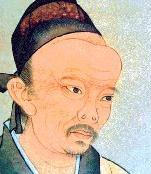Difference between revisions of "Qu Yuan"
From Wiki China org cn
imported>Superleila (Created page with 'Qu Yuan (c. 339-278 BC) was a minister in the State of Chu with an important position. However, the Chu king fell under the influence of other corrupt, jealous ministers who slan...') |
imported>Ciic |
||
| Line 1: | Line 1: | ||
| + | [[file:The portrait of Qu Yuan.JPEG|thumb|200px|The portrait of Qu Yuan]] | ||
| + | |||
Qu Yuan (c. 339-278 BC) was a minister in the State of Chu with an important position. However, the Chu king fell under the influence of other corrupt, jealous ministers who slandered Qu Yuan, and banished the most loyal counselor to a place called Xiang. In 278 BC, the State of Chu was conquered by the powerful Qin. Hearing the news, Qu Yuan waded into the Miluo River while holding a huge rock to commit ritual suicide for his country. As a great poet, he wrote Li Sao (The Lament), the longest poem in ancient China. | Qu Yuan (c. 339-278 BC) was a minister in the State of Chu with an important position. However, the Chu king fell under the influence of other corrupt, jealous ministers who slandered Qu Yuan, and banished the most loyal counselor to a place called Xiang. In 278 BC, the State of Chu was conquered by the powerful Qin. Hearing the news, Qu Yuan waded into the Miluo River while holding a huge rock to commit ritual suicide for his country. As a great poet, he wrote Li Sao (The Lament), the longest poem in ancient China. | ||
[[category:people]] | [[category:people]] | ||
Revision as of 01:59, 31 May 2011
Qu Yuan (c. 339-278 BC) was a minister in the State of Chu with an important position. However, the Chu king fell under the influence of other corrupt, jealous ministers who slandered Qu Yuan, and banished the most loyal counselor to a place called Xiang. In 278 BC, the State of Chu was conquered by the powerful Qin. Hearing the news, Qu Yuan waded into the Miluo River while holding a huge rock to commit ritual suicide for his country. As a great poet, he wrote Li Sao (The Lament), the longest poem in ancient China.
